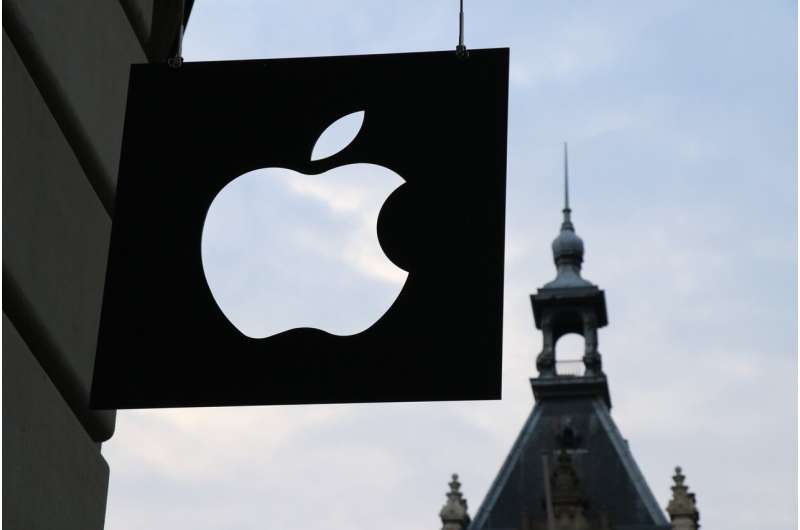
Another day, another multibillion-dollar regulatory fine from Europe that will barely dent the balance sheet of a technology giant. Only this time the European Commission's $2 billion penalty against Apple Inc. marks the end of an old, clunky era, and the start of a new one where trust-busters can be quicker and more efficient in policing Silicon Valley's biggest companies. Their secret weapon: a new law called the Digital Markets Act (DMA). It finally comes into force on March 6, when six companies designated as "gatekeepers" will have to comply with its 22 rules.
Apple's case is a prime example of how things will change. Its €1.8 billion ($2 billion) penalty comes after an old complaint from Spotify Technology SA over the alleged stranglehold of Apple's App Store. The fine is barely a scratch for Apple, which made $120 billion in first-quarter sales, but it symbolizes a new approach for Europe's antitrust regulators, who already take more action against tech firms than their US counterparts. Now they can do more with less to challenge the growing dominance of tech firms worth north of $10 trillion, or more than the combined annual gross domestic products of Germany and Japan.
The first reason is the DMA law itself. Until now, the European Commission has had to spend years gathering evidence and proving the anticompetitive effects of tech firm's behavior in their cases. Spotify's complaint against Apple was made five years ago. Another recent investigation by the EU into Alphabet Inc.'s Google took seven years. European law says you can only prohibit conduct if you can prove, with empirical evidence, that it has hurt consumer welfare. The result: Cases take years and are painfully expensive.
But the DMA offers a new legal loophole. It doesn't require a detailed analysis of how a large company has caused consumer harm. So as long as it can prove that a firm broke one of the law's 22 rules, the harm is presumed. That saves years of potential work.
There are rules against things like self-preferencing to stop a company like Google from making its products look better than its competitors in search results, for instance, or reusing people's data across different platforms, such as between Meta Platforms Inc."s Facebook and WhatsApp. Rule-breakers will be hit with fines worth as much as 10% of their turnover. Worse, they could be banned from making acquisitions.
One of the directives echoes the EU's complaint against Apple: that it blocked other companies like Spotify from telling users about lower-priced subscriptions available outside of their iPhone apps.
So why did the EU pursue an expensive five-year-long case when it could have used its shiny new enforcement tool, the DMA, in two days' time? One reason might simply be the sunk-cost fallacy on a case started a long time ago. Another might be to send a message that it will continue using traditional antitrust enforcement laws even though it has the DMA's rapid, cheap and blunt approach.
"I have my doubts it will," says Anne Witt, an antitrust scholar with EDHEC Business School. "Why would you spend so much more money when you have this other tool?" The DMA, in other words, is the future.
The Apple case and the new law also spotlight an increasingly popular regulatory philosophy in Europe around fairness. For years, antitrust regulators in the US and Europe followed the doctrine of the Chicago School, which aims to support consumer welfare through market-driven outcomes. Under that philosophy, many of the mergers and business practices that seem monopolistic are also considered beneficial to consumers because they lead to supposedly lower prices and increased innovation. If Facebook is free and innovative, in other words, there's no harm done.
European regulators have caught on to how irrelevant that approach is in today's digital markets. "Suddenly 'fairness' is making a comeback in Europe," says Witt.
The European Commission said Monday that a big chunk of the harm Apple caused to consumers was a "non-monetary harm in the form of a degraded user experience." The reason? The company's behavior had amounted to "unfair trading conditions."
Call this a light entrée to the new era of the DMA, which has the fairness issue baked into its rules—the words "fair," "fairness" or "unfair" appear in the act 90 times, offering a more up-to-date and thoughtful approach to the economic pitfalls of digital dominance.
Many officials in Brussels will no doubt say "good riddance" to lengthy court battles—like the one they now face with Apple, which says it will appeal Monday's ruling—and embrace the DMA's clear structure. But risks remain. The rules might inadvertently ban some innovative or competitive corporate activities or miss bad conduct that's not on its list of mandates.
Still: "(It's) as clear as any law can ever be," says Witt. Anything that makes regulation more transparent and effective, as well as quicker to catch up with technology as it whizzes ahead, is a step in the right direction.
2024 Bloomberg L.P. Distributed by Tribune Content Agency, LLC.
Citation: Apple's $2 billion fine heralds a new antitrust dawn (2024, March 5) retrieved 5 March 2024 from https://techxplore.com/news/2024-03-apple-billion-fine-heralds-antitrust.html
This document is subject to copyright. Apart from any fair dealing for the purpose of private study or research, no part may be reproduced without the written permission. The content is provided for information purposes only.
